Joe Biden has laid out a clear vision for a new foreign policy committed to reestablishing American leadership and reinitiating the push for global democracy. As the first president in decades to enter office with significant foreign policy experience, he has backed up this rhetoric by assembling a reliable leadership team and reaffirming his long-standing commitment to multilateralism, diplomacy, dignity, and human rights—traditional values that, in the current political climate, are refreshingly bold.
With growing young societies eager for more open government, but facing widespread democratic backsliding, sub-Saharan Africa represents an important place for Biden to put his foreign policy ambitions into practice. Despite a monumental list of priorities, Biden made time in his first 100 days to deliver a speech at the African Union Summit—a rarity for an American president. This promising overture must now be backed up by policies that reckon with the fundamental flaws in America’s long history of democratic advancement abroad in order to reimagine democracy building from the bottom up.
America’s past democracy-building interventions in sub-Saharan Africa have often been marred by consistent and preventable shortcomings: choosing leaders, rather than supporting societies; short-term interventions that build a façade of democracy, rather than its foundations; and surface-level diplomatic efforts, rather than earnest partnership building. In Uganda, for instance, where January’s election saw rampant political oppression and violence, it was the U.S. that backed Museveni’s rise to power nearly four decades ago. More recently, billions spent on democracy building in South Sudan created a state still lacking in key infrastructure for democracy, such as legal institutions and access to education.
Although some efforts, such as initiatives to strengthen judiciaries and local governance, have shown promise, to truly reverse this trend Biden must recognize that democracy is a long-term project fundamentally based in the power, organization, and voice of the people. American policy should promote the leadership and empowerment of the robust network of community organizations, nonprofits, and individuals advocating for these causes in their own countries. From mobilizing rural communities to demand government services to taking on strategic human rights litigation and providing judicial trainings, sub-Saharan Africa’s rich civil society speaks to a clear desire for more participatory, open government.
Local groups hold unparalleled contextual knowledge, trust from the people they serve, and ability to respond to events as they arise. They have proven success protecting basic rights and providing education, health, and other services. In the Democratic Republic of the Congo, peoples’ movements are more trusted and effective than conventional political parties. Sudan and Mali show us they can be the driving force behind popular democratic uprisings.
What these organizations generally lack is capacity, recognition, and political support. Biden’s administration has the power to address these gaps by investing more in direct funding and technical assistance. Small organizations taking on the grand task of democracy building require enduring support to achieve their visions. These investments should be part of long-term commitments that show America’s earnest partnership with African societies. While increased U.S. participation in COVAX and investment in economic recovery abroad is urgent, Biden’s administration must be prepared to rebalance an aid budget that spends 70 percent of funds ($5.4 billion) on health initiatives compared to 4 percent ($312.4 million) on democracy, human rights, and governance, which will ultimately improve service delivery and, thus, better long-term health outcomes. Further, America should turn away from costly, unpopular military interventions and fickle short-term aid programs that drain resources and stoke resentment among African publics.
As Biden’s team prepares the flagship Summit for Democracy, they can demonstrate that civil society groups should not just have a seat at the table, but should play an integral role in setting the agenda and speaking for the people they represent. Civil society organizations and the people they bring together form the infrastructure for democratic progress. Supporting them and allowing them to realize their own vision of democracy will go much further than imposing elections on a revolving door of political elites.
Further, the U.S. must do more to defend those who speak out against government abuses and champion political freedom. Biden’s policies have to live up to his acknowledgement that “free press is essential to the health of a democracy.” From Guinea to Tanzania to Zimbabwe, America has consistently missed opportunities to substantiate statements against political repression and violence with clear action, such as targeted sanctions and multilateral diplomatic pressure. Such prevarication reduces America’s credibility and emboldens authoritarian regimes to continue imprisoning opposition leaders, intimidating human rights defenders and journalists, and eroding judicial independence. Moreover, along with vocal support for their cause, the U.S. should amplify training and funding for those fighting to increase freedom and transparency in their countries and, when necessary, be prepared to offer them protection.
These investments must be accompanied by efforts to encourage and empower African institutions as guarantors of democracy. The U.S. should deploy diplomatic and technical resources to help reinvigorate regional bodies. The Economic Community of West African States, which has responded hesitantly to constitutional override in recent elections, will be crucial in addressing severe violence in the Sahel and a tenuous situation in Mali. In southern Africa, The Southern African Development Community should reestablish its regional tribunal and assume leadership in rule of law and human rights.
African multilateral bodies can also help create conditions conducive to democracy by addressing economic, health, and environmental issues that inhibit government participation. In East Africa, the U.S. should use trade and investment tools to incentivize the East African Community to unlock the region’s underleveraged economic potential and improve weak political ties. Simultaneously, the U.S. should vigorously back continentwide initiatives like the African Continental Free Trade Agreement and Great Green Wall, and work with our allies to support African Union leadership on urgent issues such as collective debt relief and distribution of the COVID-19 vaccine.
From the outset, Biden and his team should set a new tone by increasing official state visits with African leaders. But a commitment to bottom-up democracy must also include more expansive, people-centric diplomacy. In-depth contextual knowledge and strong relationships are needed to identify the right opportunities for investment, build trust, and create nonfinancial levers for influence. The character of America’s diplomatic corps should be based on individuals prepared and empowered to engage in this effort. Finally, America should invest in academic, commercial, and cultural exchanges that allow citizens from both sides of the Atlantic to increase mutual understanding and set the long-term foundations for democratic partnership and progress.
Biden’s foreign policy vision has promising prospects in sub-Saharan Africa. To avoid the pitfalls of his predecessors, however, his administration must have the courage to build long-term policies that empower African civil society, community groups, and individuals to be not just the “frontlines in defense of democracy,” but the bottom line.
The Brookings Institution is committed to quality, independence, and impact.
We are supported by a diverse array of funders. In line with our values and policies, each Brookings publication represents the sole views of its author(s).

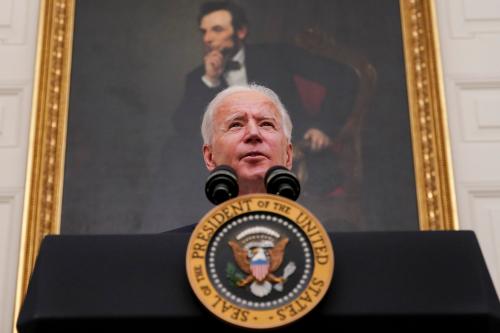
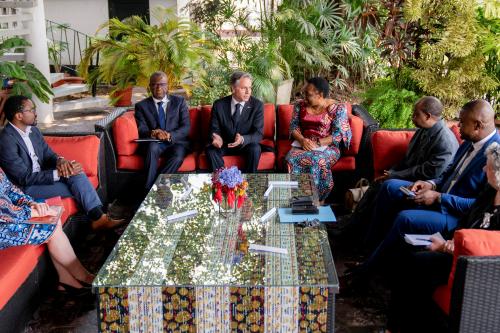
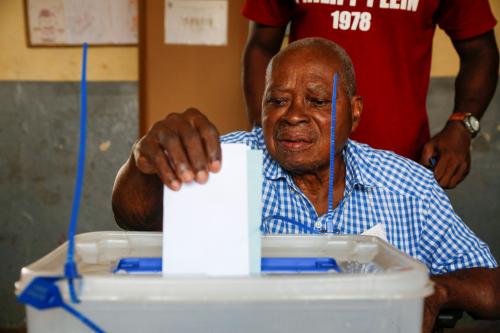
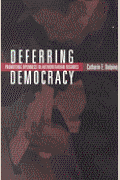

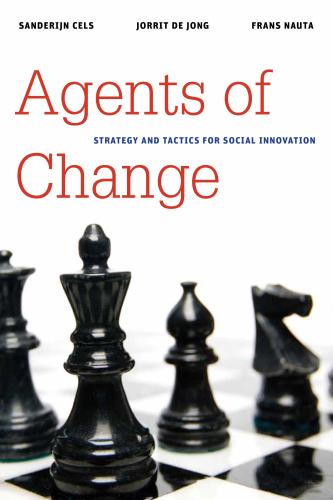





Commentary
Civil society should anchor Biden’s democracy agenda in Africa
April 23, 2021